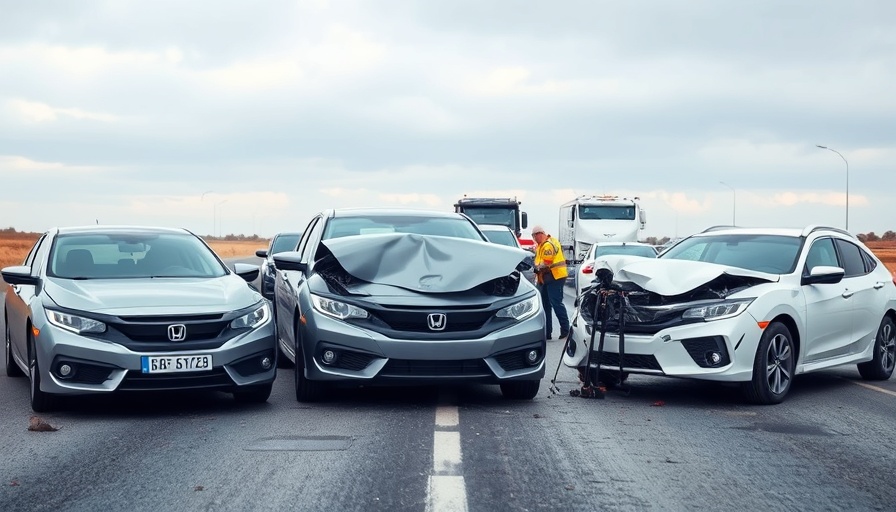
Understanding Your Options: What Happens if You’re Not at Fault and Have No Insurance?
Navigating the world of automobile insurance is complex, particularly when you find yourself in a situation where you’ve been involved in an accident but lack insurance coverage. It’s critical to understand your options and the legal implications of driving without insurance, especially if you are not at fault in an incident.
The Basics of Insurance Responsibility
In most states, auto insurance is not just a smart financial decision; it's a legal requirement. Drivers are typically mandated to carry liability insurance, which protects them and others in the event of an accident. However, what happens when you're the innocent party in an accident but don’t have any insurance? Understanding liability is key.
Understanding State Laws: What's at Stake?
The consequences of not having insurance can vary significantly based on state laws. In some jurisdictions, penalties for driving uninsured can include hefty fines, license suspensions, and possible criminal charges.
If you are not at fault in an accident, ideally, the at-fault driver’s insurance should cover your damages. However, when you lack your own policy, recovery options become limited. Some states allow uninsured motorists to still pursue claims against the at-fault driver, but proving your case without insurance adds complications.
The Challenge of Proof
One major hurdle for drivers lacking insurance is demonstrating fault in an accident. Typically, insurance companies employ assessors to determine fault, but if you are uninsured, you may not have access to similar resources. This can hinder your ability to collect compensation for damages.
If you find yourself in such a situation, it's advisable to collect as much evidence as possible at the scene. Photographic evidence, witness statements, and police reports can aid your case when negotiating with the other party's insurance company.
What If the Uninsured Driver is at Fault?
If the driver responsible for the accident is uninsured, gathering evidence becomes even more crucial. You may have to resort to filing a personal injury lawsuit against the at-fault driver directly—if they have the financial capability to pay for the damages, which can often be a gamble.
In such circumstances, understanding the nature of the relationship between auto insurance, automobile industry standards, and regulations becomes essential to protect yourself against future issues.
The Financial Implications of Not Having Insurance
Being involved in an accident without insurance can significantly impact your finances. Without coverage, you may be responsible for covering all repair costs, medical bills, and possibly even legal fees. This situation underscores the importance of weighing your options when considering insurance coverage.
Not only does being uninsured increase your financial risk during an accident, but potential repercussions might also lead to higher insurance rates in the future, even if you decide to get coverage after the incident.
Understanding Alternatives and Resources
Even if you find yourself uninsured, a variety of resources are available from non-profit organizations and governmental agencies that aim to assist individuals in navigating their legal rights. Seeking legal counsel can be beneficial, as professionals can advise you on filing claims against the at-fault party.
You should consider exploring free legal advice resources available to those dealing with traffic accidents. Many offer advice and consultations that cater to your specific circumstances.
Preventative Measures: Protecting Yourself on the Road
To avoid the repercussions of being uninsured while on the road, it's crucial to prioritize auto insurance. The automobile industry has seen various shifts, and monitoring the top automotive industry practices can help guide your decision on the kind of insurance coverage you should secure.
Additionally, staying informed about the legal changes in your region can help keep your driving record safe and insurance costs manageable. Following automotive brand names within the industry can offer insights into the latest trends and products that could lower your insurance rates.
Always remember, being proactive about insurance not only protects you financially during an accident but may also enhance your overall driving experience.
Final Thoughts on Insurance and Driving
While being involved in an accident without insurance can pose challenges, there are routes available to reclaim your losses, particularly when not at fault. By understanding your state's regulations, gathering the right evidence, and knowing when to seek legal guidance, you can navigate this tough scenario more effectively. Each step taken today can significantly impact your tomorrow in the automobile world.
Ultimately, the best course of action is to obtain insurance before hitting the road—the benefits far outweigh the costs in the long run. Protect yourself and drive responsibly.
 Add Row
Add Row  Add
Add 




Write A Comment